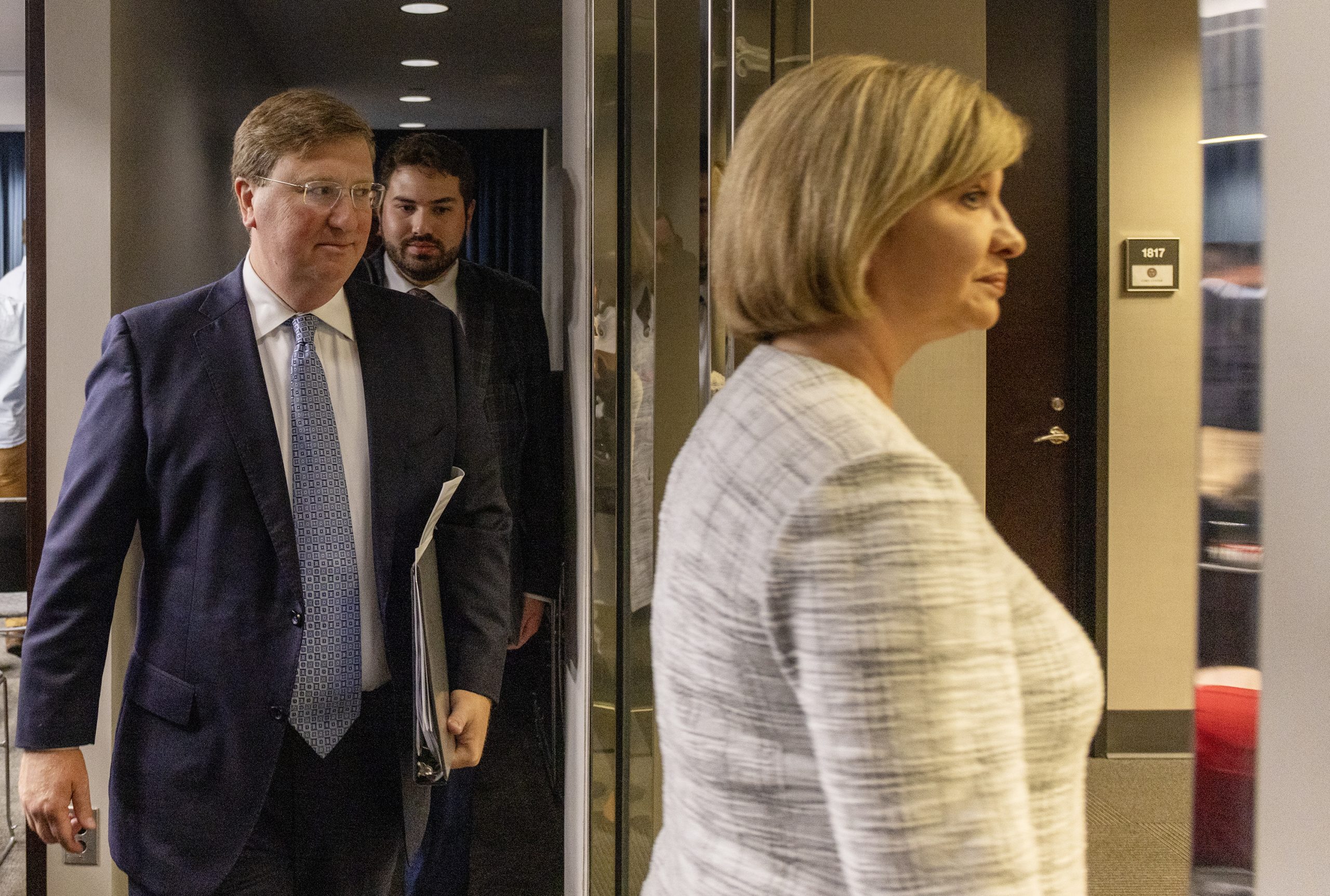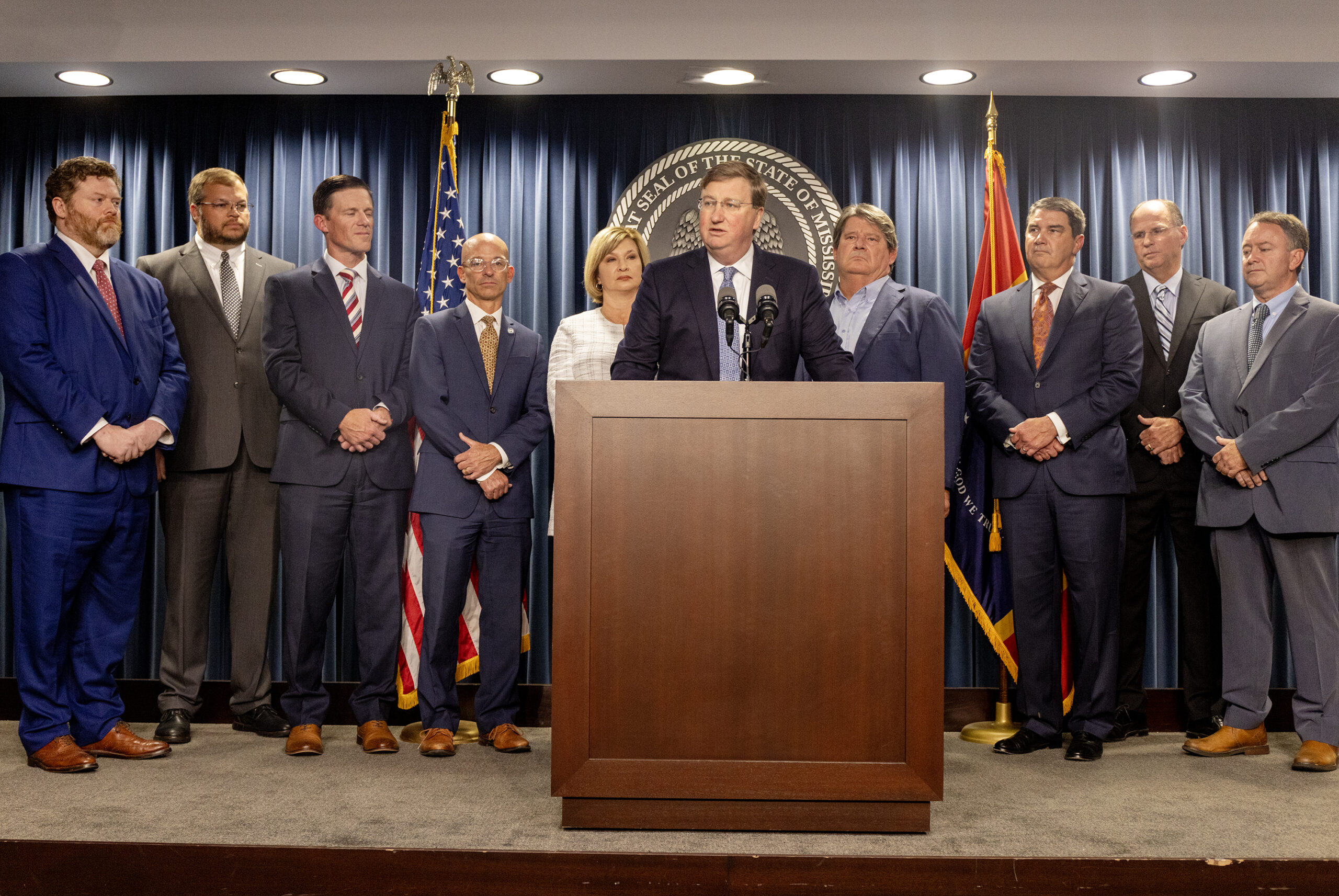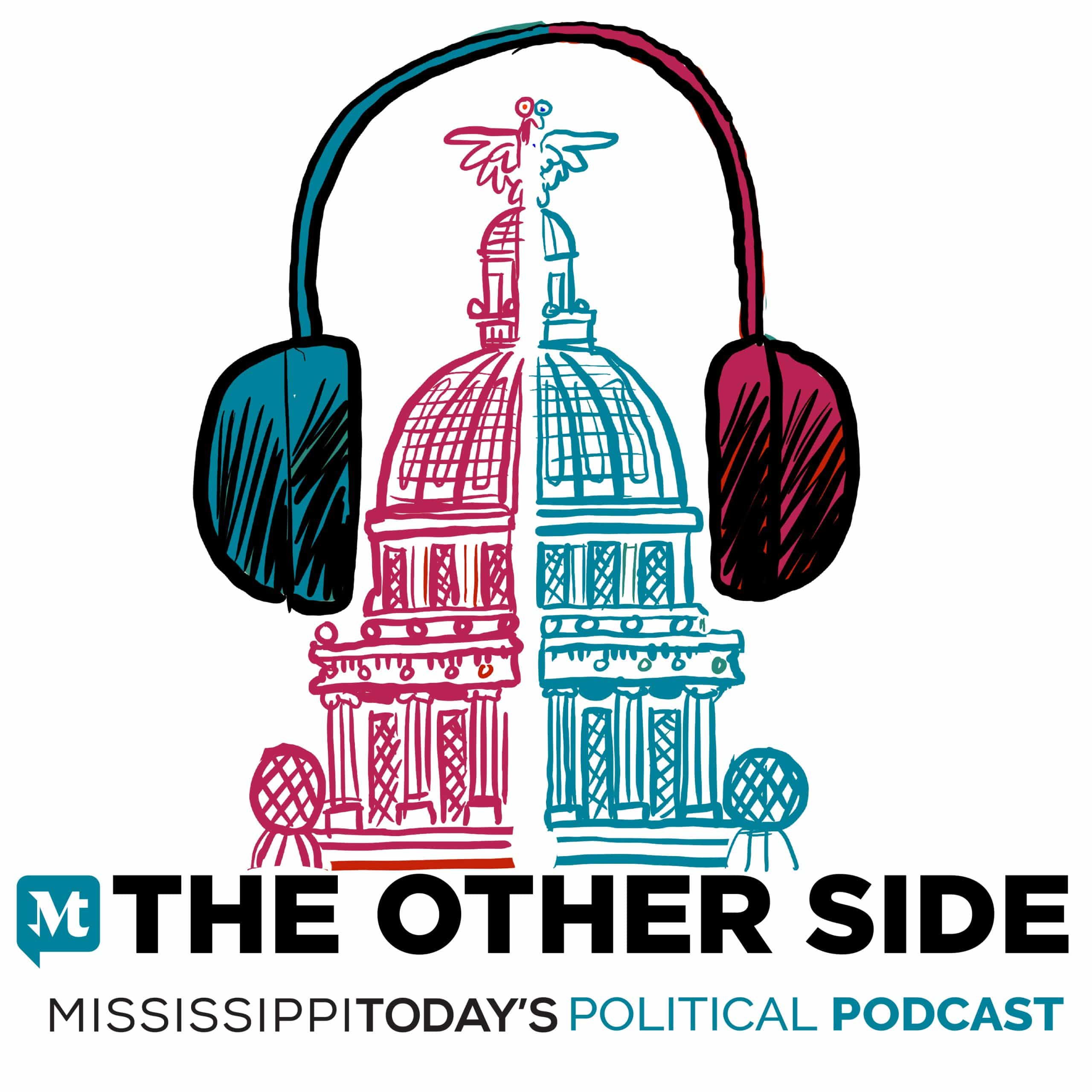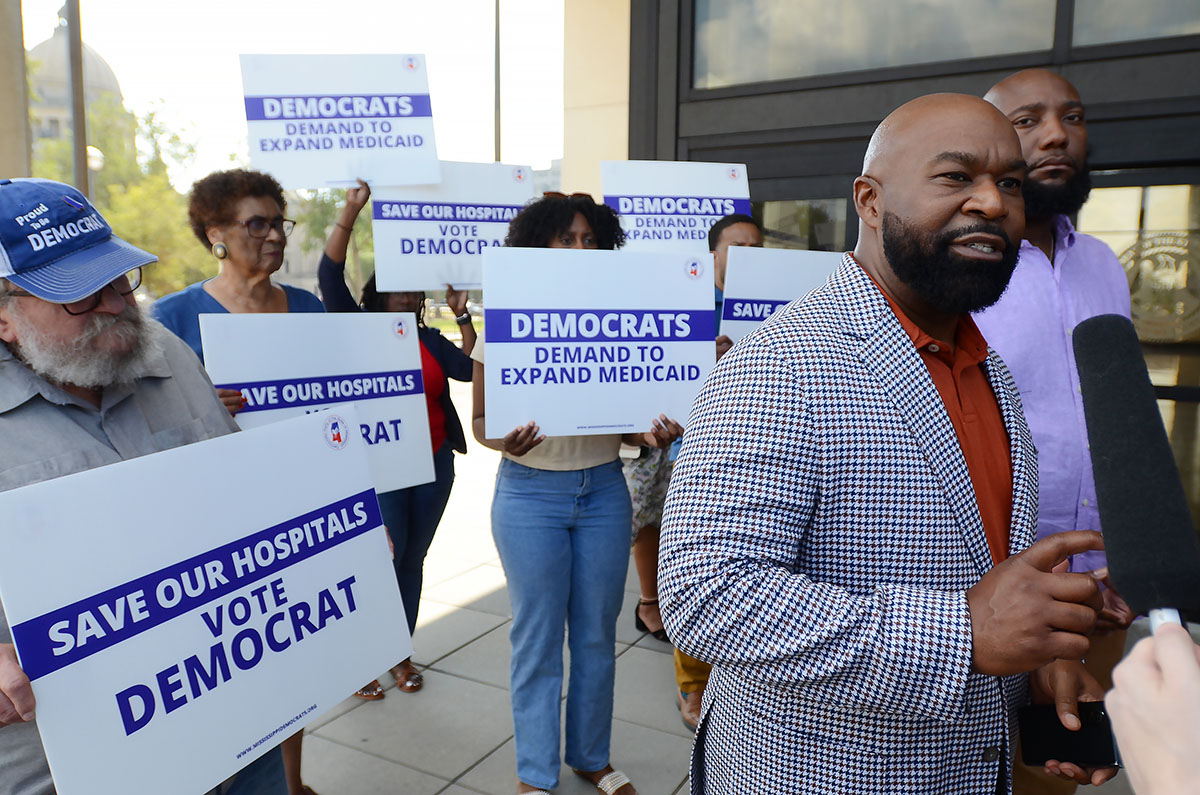Mississippi Today
Gov. Reeves announces 11th hour plan for hospital crisis. Opponents pan it as ‘too little, too Tate’

After being criticized for months by his Democratic opponent for not having a plan to address Mississippi's health care crisis, Gov. Tate Reeves on Thursday unveiled what he called “sweeping Medicaid reimbursement reforms.”
Reeves' proposal, announced less than two months before the November election, includes pulling more federal dollars to increase Medicaid reimbursement to hospitals — a plan that Reeves' own Medicaid administration advised GOP lawmakers and hospital leaders last year wouldn't work.
Hospitals under the plan would pay an increase in “bed taxes,” but this would allow more federal dollars to be drawn down for a net to hospitals of $689 million, Reeves said. His plan also includes a measure to allow speedier prior insurance authorization of drugs or procedures, a measure lawmakers had passed but Reeves vetoed earlier this year.
Reeves' plan does not include Mississippi accepting more than $1 billion a year in federal dollars to expand Medicaid to cover the working poor as 40 other states have done.
The governor's plan was immediately panned on Thursday by supporters of Medicaid expansion and of his opponent, who dubbed his proposal, “too little, too Tate.” State political observers speculated Reeves' new plan is a result of polling and of Mississippi's GOP legislative leadership warming to the idea of Medicaid expansion.
READ MORE: Likely new Speaker Jason White says Medicaid expansion ‘will be on table'
Tim Moore, president of the Mississippi Hospital Association, on Thursday said, “Who would have ever thought donating $250,000 to a Democrat would have motivated a Republican so much?” He was referring to MHA's PAC donating to Democratic gubernatorial candidate Brandon Presley.
Moore said he was appreciative of Reeves' proposal, but “surprised by what was presented because they're things we've proposed for years.”
“It still does nothing to help the low-wage earners in Mississippi who do not have the disposable income to pay for medical care,” Moore said. “What's the difference in taking federal money to do this, and taking federal money to cover working poor people?”
Reeves reiterated his opposition to Medicaid expansion, which he referred to as “welfare,” as he gave a press briefing on his new plan, which would have to be approved by the federal Centers for Medicaid Services. Reeves said the plan was submitted to CMS on Thursday, and that approval or disapproval could take months.
“This will have a profound impact on the bottom line of hospitals across the state, large and small,” Reeves said Thursday. As for Mississippi's highest-in-the-nation rate of people without insurance, Reeves reiterated that they need to get a job or better job.
“We need more people in the workforce,” Reeves said. “… I am focused on bringing better and higher paying jobs and providing opportunity for Mississippians to train for the jobs of tomorrow and have their insurance through their employer.”
READ MORE: Nearly half of rural hospitals at risk of closure in Mississippi, new data shows
Reeves' proposal on Thursday was immediately blasted by his Democratic opponent Brandon Presley, who has made Medicaid expansion to cover the working poor with federal dollars a major plank in his platform.
“If Tate Reeves really cared about ending the hospital closure crisis he created, he would call a special session and expand Medicaid so working families can get the healthcare they need,” Presley said in a statement. “Tate Reeves has had 12 long years to do something about Mississippi's hospital crisis and 47 days before an election is too little, too late for the hospitals that have cut essential services, lost jobs, or are on the brink of closing altogether.
“Today's announcement is nothing more than an election year stunt and just more proof that Tate Reeves is a craven, failed governor who will always look out for himself and his political career ahead of the health of Mississippi families,” Presley said.
Other state Democratic leaders held a small rally outside Reeves' office building after his announcement. They chanted, “Too little, too Tate,” and called for Medicaid expansion.
“Tate Reeves does not care about the $1 billion it would bring into our state or the 10,000 jobs it would create,” said state Democratic Party chairman and state Rep. Cheikh Taylor. “At the end of the day, Tate Reeves does not care. He cares about what his political position is in the final days of the election.”
Reeves proposal, if approved by CMS, would reimburse providers of Medicaid managed care services near the rate at which private insurers pay. It would reimburse hospitals for treating Medicaid fee-for-service patients at the upper level of what Medicare pays, higher than Medicaid's normal rate. Hospitals would pay more in bed taxes to cover the state's share of the higher rates, and lose some federal payments for treating uninsured patients, but would net an estimated $689.5 million, Reeves said.
Republican legislative leaders and the hospital association starting last year pushed a similar proposal to increase Medicaid reimbursements to hospitals, but were told by Reeves' Medicaid administrators that it wouldn't work — and would only bring in about $40 million — because the state's rate of commercial insurance payments are so low.
When asked about this on Thursday, Reeves deferred the question to Medicaid Director Drew Snyder, who cryptically answered that the difference in projections this year versus last year is because, “We got the right people in the room.”
Republican Lt. Gov. Delbert Hosemann on Thursday said: “Last year, around this time, our office met with Medicaid and hospitals to discuss hospital payment initiatives, but we were told by Medicaid that these changes were not currently possible. The Legislature then turned to alternatives … We are always happy to discuss long-term solutions to stabilize hospitals in Mississippi and improve access to care.”

Reeves presented his plan in a press conference flanked by several executives of the state's largest hospitals. None of them spoke, and they were not made available for media questions in the briefing.
Gary Marchand is interim CEO of Greenwood Leflore Hospital, one of many small rural hospitals in Mississippi teetering on the brink of closure. Reeves, in his presser on Thursday, provided a sheet that showed Greenwood Leflore would receive an extra $10 million a year if his plan gets federal approval.
Marchand, contacted on Thursday, said he's unsure how much of an impact the additional money would make, but he's appreciative of “any efforts to provide additional cash resources in support of our operations.” He also added, “We are hopeful for a rapid approval process.”
Reeves on Thursday vowed his new plan is “just the beginning.”
“Our eyes are set on the future, and we aim to continue ushering in reforms that strengthen Mississippi's healthcare system no matter where you live in the state,” Reeves said.
Mississippi Today reporter Devna Bose contributed to this story.
This article first appeared on Mississippi Today and is republished here under a Creative Commons license.
Mississippi Today
Podcast: The controversial day that Robert Kennedy came to the University of Mississippi

Retired U.S. Bankruptcy Judge Edward Ellington talks with Mississippi Today's Bobby Harrison and Geoff Pender about former U.S. Attorney General Robert Kennedy's speech at the University of Mississippi less than four years after the riots that occurred after the integration of the school. Ellington, who at the time headed the Ole Miss Speaker's Bureau as a law school student, recalls the controversy leading up to the speech.
This article first appeared on Mississippi Today and is republished here under a Creative Commons license.
Did you miss our previous article…
https://www.biloxinewsevents.com/?p=359978
Mississippi Today
On this day in 1961
MAY 20, 1961

A white mob of more than 300, including Klansmen, attacked Freedom Riders at the Greyhound Bus Station in Montgomery, Alabama. Future Congressman John Lewis was among them.
“An angry mob came out of nowhere, hundreds of people, with bricks and balls, chains,” Lewis recalled.
After beating on the riders, the mob turned on reporters and then Justice Department official John Seigenthaler, who was beaten unconscious and left in the street after helping two riders.
“Then they turned on my colleagues and started beating us and beat us so severely, we were left bloodied and unconscious in the streets of Montgomery,” Lewis recalled.
As the mob headed his way, Freedom Rider James Zwerg said he asked for God to be with him, and “I felt absolutely surrounded by love. I knew that whether I lived or died, I was going to be OK.”
The mob beat him so badly that his suit was soaked in blood.
“There was nothing particularly heroic in what I did,” he said. “If you want to talk about heroism, consider the Black man who probably saved my life. This man in coveralls, just off of work, happened to walk by as my beating was going on and said ‘Stop beating that kid. If you want to beat someone, beat me.' And they did. He was still unconscious when I left the hospital.”
To quell the violence, Attorney General Robert Kennedy sent in 450 federal marshals.
This article first appeared on Mississippi Today and is republished here under a Creative Commons license.
Mississippi Today
2024 Mississippi legislative session not good for private school voucher supporters
Despite a recent Mississippi Supreme Court ruling allowing $10 million in public money to be spent on private schools, 2024 has not been a good year for those supporting school vouchers.
School-choice supporters were hopeful during the 2024 legislative session, with new House Speaker Jason White at times indicating support for vouchers.
But the Legislature, which recently completed its session, did not pass any new voucher bills. In fact, it placed tighter restrictions on some of the limited laws the state has in place allowing public money to be spent on private schools.
Notably, the Legislature passed a bill that provides significantly more oversight of a program that provides a limited number of scholarships or vouchers for special-needs children to attend private schools.
Going forward, thanks to the new law, to receive the vouchers a parent must certify that their child will be attending a private school that offers the special needs educational services that will help the child. And the school must report information on the academic progress of the child receiving the funds.
Also, efforts to expand another state program that provides tax credits for the benefit of private schools was defeated. Legislation that would have expanded the tax credits offered by the Children's Promise Act from $8 million a year to $24 million to benefit private schools was defeated. Private schools are supposed to educate low income students and students with special needs to receive the benefit of the tax credits. The legislation expanding the Children's Promise Act was defeated after it was reported that no state agency knew how many students who fit into the categories of poverty and other specific needs were being educated in the schools receiving funds through the tax credits.
Interestingly, the Legislature did not expand the Children's Promise Act but also did not place more oversight on the private schools receiving the tax credit funds.
The bright spot for those supporting vouchers was the early May state Supreme Court ruling. But, in reality, the Supreme Court ruling was not as good for supporters of vouchers as it might appear on the surface.
The Supreme Court did not say in the ruling whether school vouchers are constitutional. Instead, the state's highest court ruled that the group that brought the lawsuit – Parents for Public Schools – did not have standing to pursue the legal action.
The Supreme Court justices did not give any indication that they were ready to say they were going to ignore the Mississippi Constitution's plain language that prohibits public funds from being provided “to any school that at the time of receiving such appropriation is not conducted as a free school.”
In addition to finding Parents for Public Schools did not have standing to bring the lawsuit, the court said another key reason for its ruling was the fact that the funds the private schools were receiving were federal, not state funds. The public funds at the center of the lawsuit were federal COVID-19 relief dollars.
Right or wrong, The court appeared to make a distinction between federal money and state general funds. And in reality, the circumstances are unique in that seldom does the state receive federal money with so few strings attached that it can be awarded to private schools.
The majority opinion written by Northern District Supreme Justice Robert Chamberlin and joined by six justices states, “These specific federal funds were never earmarked by either the federal government or the state for educational purposes, have not been commingled with state education funds, are not for educational purposes and therefore cannot be said to have harmed PPS (Parents for Public Schools) by taking finite government educational funding away from public schools.”
And Southern District Supreme Court Justice Dawn Beam, who joined the majority opinion, wrote separately “ to reiterate that we are not ruling on state funds but American Rescue Plan Act (ARPA) funds … The ARPA funds were given to the state to be used in four possible ways, three of which were directly related to the COVID -19 health emergency and one of which was to make necessary investments in water, sewer or broadband infrastructure.”
Granted, many public school advocates lamented the decision, pointing out that federal funds are indeed public or taxpayer money and those federal funds could have been used to help struggling public schools.
Two justices – James Kitchens and Leslie King, both of the Central District, agreed with that argument.
But, importantly, a decidedly conservative-leaning Mississippi Supreme Court stopped far short – at least for the time being – of circumventing state constitutional language that plainly states that public funds are not to go to private schools.
And a decidedly conservative Mississippi Legislature chose not to expand voucher programs during the 2024 session.
This article first appeared on Mississippi Today and is republished here under a Creative Commons license.
-
Our Mississippi Home7 days ago
Beat the Heat with Mississippi’s Best Waterparks
-
SuperTalk FM4 days ago
State auditor cracking down on Mississippians receiving unemployment benefits
-
Kaiser Health News7 days ago
Medicaid ‘Unwinding’ Decried as Biased Against Disabled People
-
Mississippi News Video6 days ago
Jackson has a gang problem
-
Local News3 days ago
Family files lawsuit after teen’s suicide in Harrison County Jail
-
Mississippi Today5 days ago
On this day in 1950
-
228Sports6 days ago
George County Pours Runs In 6A South State Title Victory At PRC
-
Our Mississippi Home3 days ago
Deer Fly Season on the Coast – Oh My!







































